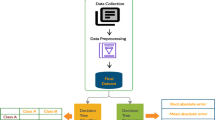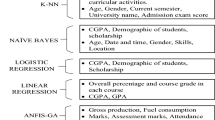Abstract
The use of machine learning with educational data mining (EDM) to predict learner performance has always been an important research area. Predicting academic results is one of the solutions that aims to monitor the progress of students and anticipates students at risk of failing the academic pathways. In this paper, we present a framework for predicting student performance based on Machine Learning algorithm at H.E.K high school in Morocco from 2016 to 2018. The proposed model was analyzed and tested using student’s data collected from The School Management System “MASSAR” (SMS-MASSAR). The dataset used in this study concerns 478 Physics students during the school years: 2015–2016, 2016–2017 and 2017–2018. The predictive performance results showed that our model can make more precise predictions of student’s performance.







Similar content being viewed by others
Explore related subjects
Discover the latest articles, news and stories from top researchers in related subjects.Notes
Ministry memo N° 17/778 date June 22, 2017
References
Anand, M. (2019). Advances in EDM: A state of the art. Software Engineering Springer, 193–201.
Arsad, P. M., Buniyamin, N., & Ab Manan, J.-L. (2012). Neural network model to predict electrical students’ academic performance. In 4th International Congress on Engineering Education (ICEED).
Baker, R.S.J.D. Data mining for education. International encyclopedia of education McGaw, B., Peterson, P., Baker, E. (Eds.) 7, 3 (2010).
Bakhshinategh, B., Zaiane, O. R., ElAtia, S., & Ipperciel, D. (2018). Educational data mining applications and tasks: A survey of the last 10 years. Education and Information Technologies, 23(1), 537–553.
Chapman, P., Clinton, J., Kerber, R., Khabza, T., Reinartz, T., Shearer, C., & Wilrth, R. (2000). CRISP-DM 1.0 step-by-step data mining guide. The CRISP-DM consortium.
Elbadrawy, A., Studham, S., Karypis, G. (2015). Personalized multi-regression models for predicting students performance in course activities. Paper presented at the 5th international conference on learning analytics and knowledge, March 2015: 16–20.
Fernandes, E., Holanda, M., Victorino, M., Borges, V., Carvalho, R., Van Erven, G. (2019). Educational data mining: Predictive analysis of academic performance of public school students in the capital of Brazil. Journal of Business Research, 94, 335–343. https://doi.org/10.1016/j.jbusres.2018.02.012.
Hamsa, H., Indiradevi, S., & Kizhakkethottam, J. J. (2016). Student academic performance prediction model using decision tree and fuzzy genetic algorithm. Procedia Technology, 25, 326–332. https://doi.org/10.1016/j.protcy.2016.08.114 (http://www.sciencedirect.com/science/article/pii/S2212017316304613)
Han, J., & Kamber, M. (2006). Data Mining Concepts and Techniques, 2nd ed. Morgan Kauffman.
Hussain, M., Zhu, W., Zhang, W., Abidi, R., & Ali, S. (2019). Using machine learning to predict student difficulties from learning session data. Artificial Intelligence Review, 52(1), 381–407.
Iqbal, Z., Qadir, J., Mian, A.N., Kamiran, F. (2017). Machine learning based student grade prediction: A case study. arXiv preprint arXiv:1708.08744.
Khan, I., Al Sadiri, A., Ahmad, A. R., & Jabeur, N. (2019). Tracking student performance in introductory programming by means of machine learning. In 4th MEC International Conference on Big Data and Smart City (ICBDSC) (pp. 1–6).
Manjarres, A.V., Sandovalm, L.G. M., Suárez, M.S. (2018). Data mining techniques applied in educational environments: Literature review. Digital Education, n° 33.
Niemi, D., Pea, R.D., Saxberg, B., Clark, R.E. (2018). Learning analytics in education. Information Age Pub Inc (August 1, 2018).
Pojon, M. (2017). Using machine learning to predict student performance. MS thesis, University of Tampere, Faculty of Natural Sciences, 35.
Romero, C., & Ventura, S. (2013). Data mining in education. Wiley Interdisciplinary Reviews: Data Mining and Knowledge Discovery, 3(1), 12–27.
Acknowledgements
I would like to express my sincere gratitude to the H.E.K school director (Morocco), for his collaboration, particularly in the collection of data, as well as for his suggestions and encouragements made to the development of this model.
Author information
Authors and Affiliations
Corresponding author
Additional information
Publisher’s note
Springer Nature remains neutral with regard to jurisdictional claims in published maps and institutional affiliations.
Rights and permissions
About this article
Cite this article
Qazdar, A., Er-Raha, B., Cherkaoui, C. et al. A machine learning algorithm framework for predicting students performance: A case study of baccalaureate students in Morocco. Educ Inf Technol 24, 3577–3589 (2019). https://doi.org/10.1007/s10639-019-09946-8
Received:
Accepted:
Published:
Issue Date:
DOI: https://doi.org/10.1007/s10639-019-09946-8




